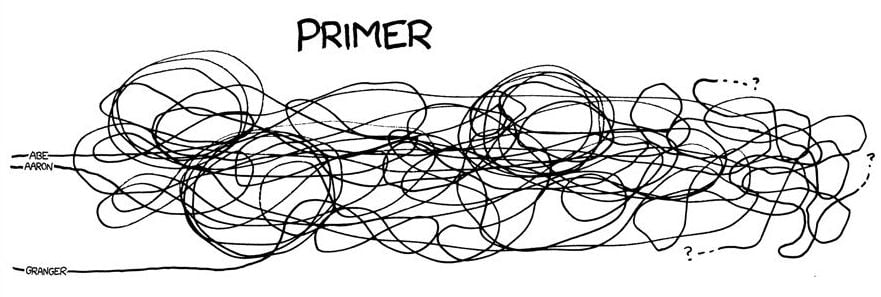Some ideas are:
- You branch off into another timeline and your actions make no difference to the previous timeline
- You’ve already taken said actions but just didn’t know about it so nothing changes
- Actions taken can have an effect (so you could suddenly erase yourself if you killed your parents)
- Only “nexus” or fixed events really matter, the timeline will sort itself out for minor changes
- something else entirely
You’ve already taken said actions but just didn’t know about it so nothing changes
12 Monkeys did this one perfectly.
You can’t change things because if you undid the thing, then there wouldn’t be a reason to undo the thing. If you go back in time, you are just going to do what you already did because that is in the past.
Probably the branch off one.
Though, speaking of time travel, I really don’t understand/like the whole Harry Potter dementor (however it’s spelt) lake scene in the movie where future Harry saves past Harry. How does that work? Wouldn’t in an initial timeline Harry have to somehow save himself before he could travel back in time to save his past self? The way I see it, it just looks like an infinite cycle of Harry saving his past self with no origin point.
That’s called the bootstrap paradox if you want to look that up.
I was just reading this article about a mathematical understanding of closed time-like curves.
In essence, the argument is that time travel to the past is possible with a degree of free will, but you would not be allowed to alter the past in such a way as to remove the motivation for traveling back in time. E.g., it would be like Futurama where Fry kills his grandfather, but he impregnates his grandmother, thus allowing himself to be born. The idea is that the timeline would correct itself and ensure that your future self will always return to the past.
I like the one where the motion of the universe is not accounted for, so the travelers drop into empty space. But someone figures out how to use that to travel through space.
Time Wars are fun though. Each prime timeline moving others toward them.
The one where you can only jump forward, not backward. It avoids the common paradoxes.
we already live in that one
See? Problem solved.
Primer because Primer. (Video warning and some spoilers for a bunch of different films.)
I don’t know if I would subscribe to it, but it is one of the more interesting ideas for time travel.
Primer spoilers, kinda, xkcd style:

Whichever one is objectively correct based on empirical evidence.
Fun fact: time travel does exist, and I am myself a time traveler. The fact that I’m travelling at one second per second along with everyone else is just a minor detail.
Imagine if someone just naturally traveled through time at like… 1.0005 seconds per second… What would that look like? Would we be able to tell? Would they be able to tell? Would their perception be different?
This is a Relativity thing, isn’t it? Like the astronaut twins sort of…
That’s exactly like being a bit closer to the bottom of a steep gravity well.
Yes, we could tell if they took a precise clock with them. In fact, we have to account for an even smaller discrepancy in order for GPS to work: we here stuck further down in Earth’s gravity well travel through time and extra ten milliseconds or so per year vs. an orbiting satellite.
Are we traveling through time? Or is time simply a universal constant of entropy? Everything you experience is energy flowing from a higher potential to a lower potential, with some “loss” to heat. Without that downward shuffle, a rock balanced on it’s tip is indistinguishable from a time-stopped version of itself.
Basically, time is your body’s sensation of the inevitable terror that is the heatdeath of the universe.
Why would it be less terrifying to be further away from a gravity well?
I think you meant this comment for a different thread.
Nope.
Okay. What did I say about gravity wells?
You implied that life would be more terrifying the faster you traveled through time, like what would happen at the bottom of a gravity well.
Where?
I like the persistent present. We simply live with the paradoxes.
“Remember when Hitler was assassinated in 1919, 1933, 1936, and 1939, then off’d himself in his bunker in '45?”
“An unidentified man in SS uniform reportedly tried to kill Hitler during a rally at the Berlin Sportpalast.” 1939
This was definitely the time traveller.
The past, present, and future do not exist as separate states.
Imagine a vast array of all possible states of matter in the universe. Imagine reality has a finite spacial resolution. With a series of numbers, or even a single very large number, you could provide a unique identifier for every possible arrangement of matter in the universe. The positions of every star and galaxy. The detailed interactions of every quark. Imagine a list or array that would have a number of entries equal to some indecent multiple of “ten to the ten to the ten…” Imagine all these possible states, every possible configuration the matter of the universe could occupy.
Then realize…All of these possible states exist at once. They are all as real as any other. There is no preferred state. They all exist in some vast “10 to the ten to the ten” dimensional spacetime. What we perceive as the flow of time is simply us moving from one of these states to another. But our consciousness cannot move arbitrarily between states. There are elaborate rules on which states you will be able to observe dependent upon the states you previously observed. We call these rules the laws of physics.
So when you travel through time, you are simply altering your path on this vast multiverse of possible realities. There is no “real” reality. They are all real. Every possible configuration of the matter and energies of the universe physically exist concurrently.
There are no timelines to split or erase, because there are no timelines. There are just conscious minds moving through a near-infinite array of possible “nows.” And all of the nows exist simultaneously. There is no real one. From the perspective of a “time traveler,” it will seem like they changed “the future.” But the truth is the very idea of a past, present, and future as distinct entities is madness. We’re just consciousness drifting through the continuum, from one of the near-infinite nows to another.
That’s a really long way to say “the first one”.
I think it’s the 2nd option
It’s just the first one, only specifically a version where all timelines exist and you simply navigate them. I can see how it might feel like the second one because the timelines already exist, but from one’s subjective viewpoint it’s #1.
I think the first one leaves open what you do, as alternate actions lead to an alternate timeline. The second is more “read-only”, similar to what OP laid out.
The only difference between the first option and the response is that the response posits that all possible timelines exist in advance and rather than generating a new timeline with your decisions, you simply navigate to the one that represents them. It’s a distinction without meaning, especially because the first option doesn’t strictly specify whether the timelines existed in advance or not. It simply says “you branch off into another timeline” with no requirement that it be one generated as a result of your actions.
The second option is called “closed loop” or Novikov self-consistency and specifically requires that the outcomes of your choices align with the past already as defined, simply in ways you did not know. It’s what they use in 12 Monkeys and the 3rd Harry Potter book, and it limits free choice, unlike the first option and what the above poster’s response stated.
I think what you’re doing is combining closed-loop and multiverse theories to say that the multiverse theory IS closed-loop simply because the multiverses existed in advance, whereas closed-loop is intrinsically single universe/timeline.
Either 1 or 3. I tend to lean towards 3







